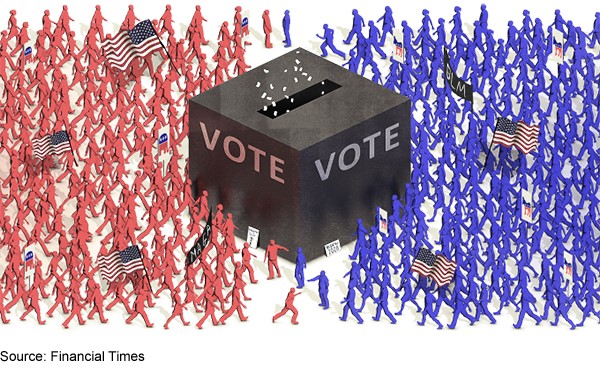-
Political shades around the world
Followers of both US and UK politics are accustomed to studying maps coloured in with either red or blue. While Europeans may find it odd that Americans use red to indicate states won by the party on the right—the rest of the world generally associates that colour with socialism—the use of only two hues suggests a kind of satisfying, binary conclusiveness. And in the context of a major global resurgence of COVID-19, many people undoubtedly look forward to closure on something, not least the seemingly never-ending US presidential campaign or the endless UK/EU trade negotiations. However, in this topsy-turvy year, a well-defined outcome for either is far from guaranteed. In the case of both the US election and Brexit, there is a likelihood that we must cope with an unclear result and extended uncertainty; in other words, with shades of grey.
We cannot predict the outturn of either the US election or the EU trade negotiations with any great certainty. Our strongest conviction: All this uncertainty is likely going to take time to sort out.

In prior decks, we have shown how election results have only a modest impact on real estate markets. However, there is evidence that extended economic or policy uncertainty does seem to play a role. And with Trump and Johnson at the reins, uncertainty is not in short supply. Let’s take each of these events in turn.
Neither the opinion polls nor the betting spreads have covered themselves in glory these past years. Nonetheless, both place Biden comfortably ahead with just a few days to go before the US election. The electoral college and the disinformation campaign surrounding postal votes suggest that the result of the election could be closer than implied by polls, almost certainly leading to a legal challenge from the loser. A contested election in the US could become a concern to private equity real estate assets if the uncertainty becomes entrenched. This concern cannot be ruled out if resolution through the courts takes several months. In normal times, this could be a survivable period for real estate; but as it will coincide with the twin threats of a COVID-19 resurgence and a stalled recovery, this uncertainty has the potential to dislodge tenants and deter investors during Q1 2021.
Meanwhile in the UK, the preferred deadline for UK/EU trade negotiations was in October; the practical deadline is sometime in November. Sensing the public’s desire for clarity, “Get Brexit Done” became the slogan of Boris Johnson’s December 2019 winning election campaign. The Brexit saga returned to the fore during 2020’s summer months as negotiations with the EU stalled. We have long argued that the short-term negative impact of a No Deal Brexit will be relatively muted, particularly when compared to the havoc wreaked by COVID-19. However, not all possible no-deal Brexits are created equal; Capital Economics[1] has argued that an “uncooperative no deal,” where talks break down in an environment of animosity, would be more damaging in the long run because it would lead to fewer agreements in the future and the expiry of temporary measures.
Moreover, uncertainty surrounding Brexit has clearly influenced the occupier and investment markets since the 2016 EU referendum. As it stands, UK real estate would most likely feel the effects of continued uncertainty to the end of 2020 or indeed beyond into 2021 should we see a short-term extension or bare-bones deal. As with the US, this Brexit-related uncertainty in the UK comes at a time when the country is struggling to get another wave of COVID-19 under control. There are many possible paths which the UK/EU relationship could take, and we may not see the full repercussions for several years to come.
The US and Europe are not alone in facing political transitions during the pandemic. Japanese Prime Minister Shinzo Abe was forced to step down in August due to health problems. At least his successor, former right-hand man Yoshihide Suga, was selected quickly and represents policy continuity. But the fizzling of Hong Kong’s pro-independence protests amid social-distancing regulations seems to come with a less definitive conclusion to the tensions there. The passage of the National Security Law comes with promises that it does not represent an end to “one country, two systems”—an outcome we believe requires appreciation for shades of grey.
Uncertainty in and of itself need not be negative for real estate. If it manifests in lower bond yields, then recent years have shown us that an income-producing asset class such as real estate could be a net beneficiary. Moreover, opportunistic investors may look to take advantage of weak currencies and cheap leverage, whilst long-term investors may move to secure prized assets at a discount. But there is nevertheless cause for caution. The UK and US are led by populist leaders who are failing to come to grips with the pandemic. They are both among the largest, most liquid, and transparent real estate markets in the world, top destinations for cross-border investment, and arguably the worst hit by the structural changes ongoing in the retail sector. We cannot predict the outturn of either the US election or the EU trade negotiations with any great certainty. Our strongest conviction: All this uncertainty is likely going to take time to sort out.
[1] “Brexit: Deal or no deal is not the big issue” Capital Economics 1 October, 2020

Jun 16, 2019
Trade Wars are Here to Stay – How can European Real Estate Investors Build Portfolio Resilience?
Until recently, free trade seemed to be a crucial ingredient to the dominant political and economic narrative.




